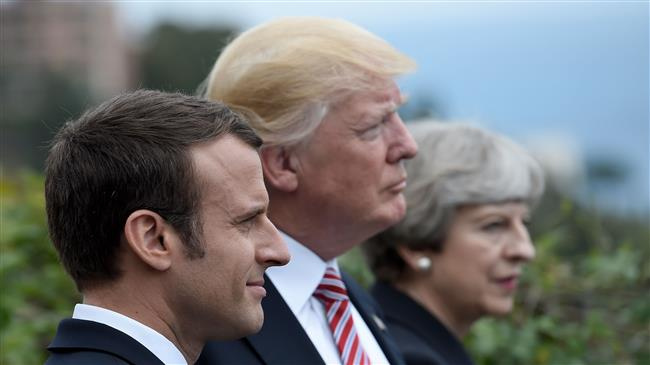The Undeclared Motives behind US Attack on Syria

The US missile attack on Syria, in complicity with France and Britain, was a flagrant violation of the sovereignty of Syria’s legitimate government. It also served as Washington’s reaction to several developments that have taken place in Syria. Firstly, it was a reaction to successive victories of the Syrian Arab Army, the Syrian government and the Resistance Front on the ground, particularly in Eastern Ghouta where they clinched a strategic victory that will serve as a turning point in political and military developments in Syria.
Liberation of Eastern Ghouta from US- and Israel-backed terrorist groups was an outstanding achievement which cleared threats from Damascus, the capital of Syria, and its periphery. After their failure to take control of Syria’s borders with Iraq in the Abu Kamal region, Americans followed a new plan: create a front from al-Tanf to Eastern Ghouta to Qalmoun [near borders with Lebanon] to set up a defense line for Israel. However, Eastern Ghouta’s retake from the terrorists by the Syrian Arab Army foiled that plot too, infuriating the Americans and Israelis.
Washington’s missile attack also indicated Saudi Arabia’s abject failure. After seven years of support from Riyadh, Eastern Ghouta, the last stronghold of Jaysh al-Islam, was wrested from them and fell under Damascus’ control.
The missile attack also indicated Washington’s desperation and the decline of its clout in the Middle East, not only regarding Syria, but also Iran, Iraq and Lebanon. From that angle, the missile attack on Syria was Washington’s expression of anger with this diminishing role. Military and political experts agree that Washington’s missile attack on Syria was more a show of weakness than a show of power. Washington even refused to enter the Syrian territory and fired its missiles from miles away.
US’ attack also showed that Americans do not comply with any international norm or law and are capable of violating them wherever deemed necessary. Washington tried to legitimize its unlawful military attack on Syria with Damascus’ alleged employment of chemical weapons in Douma as an excuse; regardless of the fact that it is impossible to carry out a chemical attack in a region as small as Douma (with an area of 1.5 kms in 2 kms) and that Damascus had turned over its chemical stockpile in 2013.
The US-UK-France attack on Syria also proves the inefficiency of the international community, particularly the UN Security Council who is responsible for securing global peace and security. Syrian developments, however, showed that the council is a pawn in the hands of powers.
Despite Washington’s struggle to bring the international community on board with its military attack on Syria, no member of the UNSC joined the American alliance; except for Britain, who has a history of malicious conduct in the Middle East, and France. Besides the US, France has also inflicted loss upon itself by joining this attack. By following Washington, Paris will create skepticism among Middle East countries about its position, particularly knowing the role Syria has been playing as a strong front against terrorism. After all, if terrorism is not reined in Syria, it would affect the security of Europe.
Advances by the Resistance Front whose benefits are not limited to Syria served as the biggest motivation for Washington to attack the country, but such attacks will bear no fruit, and will only evoke strong reaction from the Resistance Front and Russia. Tensions between Washington and Moscow are already increasingly by a daily basis, and Russia has been investing heavily in the Syrian government and the Resistance Front to its own benefits. The Islamic Republic of Iran will also continue its support for the Resistance Front in line with its interests.
* Hassan Kazemi Qomi served as Iran’s ambassador to Iraq from 2003 to 2010. This piece was originally published in Iran Daily, the official organ of Iran's government.

